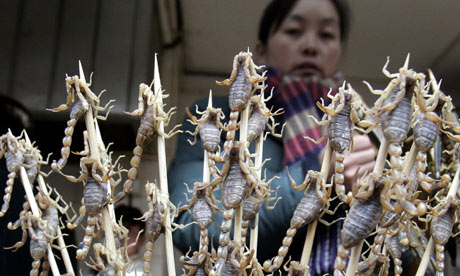Damian Carrington

A Chinese woman selling scorpions on stick waits for customers at a stall in Beijing, where the delicacy is fried in cooking oil. Photograph: Claro Cortes/Reuters
Saving the planet one plateful at a time does not mean cutting back on meat, according to new research: the trick may be to switch our diet to insects and other creepy-crawlies.
The raising of livestock such as cows, pigs and sheep occupies two-thirds of the world's farmland and generates 20% of all the greenhouse gases driving global warming. As a result, the United Nations and senior figures want to reduce the amount of meat we eat and the search is on for alternatives.
A policy paper on the eating of insects is being formally considered by the UN Food and Agriculture Organisation. The FAO held a meeting on the theme in Thailand in 2008 and there are plans for a world congress in 2013.
Professor Arnold van Huis, an entomologist at Wageningen University in the Netherlands and the author of the UN paper, says eating insects has advantages.
"There is a meat crisis," he said. "The world population will grow from six billion now to nine billion by 2050 and we know people are consuming more meat. Twenty years ago the average was 20kg, it is now 50kg, and will be 80kg in 20 years. If we continue like this we will need another Earth."
Van Huis is an enthusiast for eating insects but given his role as a consultant to the FAO, he can't be dismissed as a crank. "Most of the world already eats insects," he points out. "It is only in the western world that we don't. Psychologically we have a problem with it. I don't know why, as we eat shrimps, which are very comparable."
The advantages of this diet include insects' high levels of protein, vitamin and mineral content. Van Huis's latest research, conducted with colleague Dennis Oonincx, shows that farming insects produces far less greenhouse gas than livestock. Breeding commonly eaten insects such as locusts, crickets and meal worms, emits 10 times less methane than livestock. The insects also produce 300 times less nitrous oxide, also a warming gas, and much less ammonia, a pollutant produced by pig and poultry farming.
Full article HERE
No comments:
Post a Comment